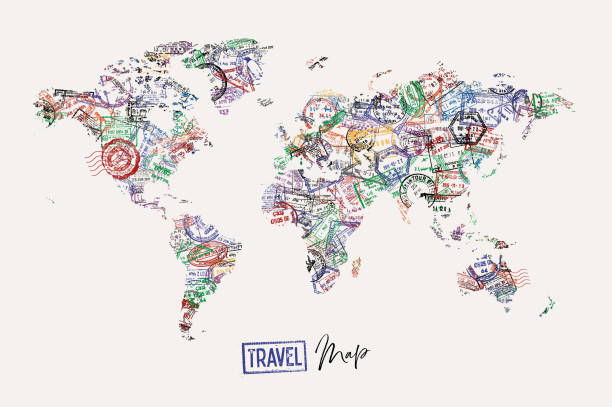This article is a guide on Digital Nomad Visas: Everything You Need to Know in 2023
Have you ever thought of traveling the world without sacrificing your career or business? If that’s you, then a digital nomad visa is what you need.
In today’s ever-changing digital world, people and organizations are constantly looking for ways to operate remotely.
That is why governments around the world have introduced digital nomad visas to cater to people like you.
To be precise, over 40 countries are already offering this type of visa. Whether you want to relocate to Portugal, Bali, or Spain, you are already covered.
Digital nomad visas simplify movement across counties. It does not only benefit the country offering it, but it also allows remote workers to legally travel around the world or live in their desired location.
But before you hit the road and start hopping from country to country, you need to be prepared. In this guide, we will cover everything you need to know about digital nomad visas in 2023.
What Is A Digital Nomad Visa And How Does It Work?
A digital nomad visa is a permit that permits you to work in a foreign nation. In most cases, you will be working for an employer outside the host country.
Alternatively, you can have an online business that you manage anywhere in the world. Initially, digital nomads worked under tourist visas, which is illegal.
At least they can enjoy their freedom legally through digital nomad visas. But you should note that digital nomad visas do not offer a pathway for citizenship or permanent residency.
Digital nomad visas usually have a validity period of more than 90 days. Besides this, these visas usually set specific parameters, such as activities you can or cannot do while in the host country, eligible countries, and general conduct while in the country.
Some notable benefits of having a digital nomad visa include:
- Given that it has a validity of at least one year, you can work and explore the country without rushing.
- You have the opportunity to work or do business legally in the host country without having to have ties with a local company.
Digital Nomad Visa Application Process
A typical application process for a digital nomad visa will involve the following:
1. Having The Necessary Requirements
The exact requirements will vary by country, but most of them will require that you:
- Have a clean criminal record.
- Have proof of income or meet the minimum wage for that country.
- Have a job, source of work, or business that is outside the destination country.
- Have proof of health insurance.
- Have these personal documents: a copy of a valid passport, a marriage certificate if applicable, passport photos, a CV, qualifications, and a copy of a birth certificate.
Take into consideration the following while preparing your documentation:
- Your civil documents, such as your marriage certificate, birth certificate, and CV, might need to be translated and certified by an attorney.
- Your passport should be valid for the next six months from the date of application.
- Take your identity pictures or passport photos on a white background with neutral facial expressions.
2. Filling Out The Application Forms
Once you have the above requirements with you, you can now fill out the digital nomad visa application form.
Some countries will let you complete the form online, while others require you to print it out and sign it. Please note that you may be required to physically fill out this form at the embassy.
3. Booking An Appointment With The Consulate Or Embassy
Once you have filled out the form or are ready to fill it out, you need to book an appointment with the embassy or consulate of the destination country.
Note that the country you intend to visit may not have an embassy in your country. But there are usually arrangements to take care of this challenge—for instance, applying through a neighboring embassy.
Once you have the appointment, be ready to attend the interview.
4. Submitting Your Application
After you have prepared the necessary documentation, submit it with the filled-out application form to the relevant embassy.
Sometimes you may need to pay upfront and submit the receipt together with the application documentation.
5. Collecting Your Visa
If you submitted all the correct documents, then you will wait for about a month to receive your visa. There isn’t a standard delivery time for these visas.
Each country has a unique application process. To avoid any delays, ensure that you submit relevant documentation. It is also advisable to submit your application early, especially during busy times.
Digital Nomad Visa Fees
Each country charges a different fee for a digital nomad visa, but it is usually between $200 and $2,000 per person.
In a few secluded cases, for instance, in the Caribbean, this cost could shoot up to $3,000 for family applications. Interestingly, some countries, such as Georgia, offer digital nomad visas for free.
Reasons For The Digital Nomad Visa Denial
A country may deny you a digital nomad visa for various reasons, but it is usually due to a lack of proof of financial stability.
Sometimes, they may deny you the visa because of your history or if you are seen as a threat to their country.
If you give out false information, it can also lead to visa denial. So, if you provide the correct documentation, prove that you can earn enough income to sustain yourself there, and have no questionable past, then it is unlikely that your application will be disapproved.
Digital Nomad Visas: Working and Living Overseas
While a digital nomad visa gives you the freedom to move to your desired destination, you must understand how it is to live and work there.
1. Income Tax Situation For Digital Nomad Visa Holders
Tax policies differ across countries. So, some may require you to file a tax return in your country, while others allow you to file in the host country.
Some countries will offer you a one-year tax exemption. Countries such as Australia require local tax for the period you stay there, while Portugal requires income tax after staying in the country for at least six months.
Barbados, on the other hand, requires no local income tax.
As you know, taxes can get complicated. So, it is recommended that you seek professional advice to do the necessary homework on the tax regime of the country you wish to visit.
2. The Type Of Work that Digital Nomads Can Do
Remote workers are the obvious seekers of digital nomad visas. So, as long as you can do your work remotely,
there isn’t any restriction on the type of job you can do as a digital nomad visa holder. But most digital nomads will fall into any of these categories:
- Digital entrepreneurs
- Content creators
- Software developers
- Digital and social media marketers
- Technology and media Designers
- Web developers
3. Staying Connected Offline and Online
As a digital nomad, the ability to work remotely is crucial to your success. You need a stable Wi-Fi connection.
Fast internet speed ensures that you deliver work on time, don’t miss important meetings, and can download heavy files.
Another factor that you need to consider when choosing a country to move to is the presence of affordable coworking spaces.
Sure, working from home is so relaxing, but sometimes you need to meet and interact with other people. And this is where coworking space comes in to fill this need.
What Are The Setbacks Of Being A Digital Nomad?
The digital nomad lifestyle is not without challenges. It can be a challenge if you are collaborating with your colleagues in a different time zone.
Another downside is that most digital nomad visas are only valid for a temporary period. So, you may not establish a strong base in foreign countries, but the flexibility of traveling around always carries more weight.
Countries That Offer An Active Digital Nomad Visa Program
- Albania
- Anguilla
- Antigua & Barbuda
- Germany
- Bahamas
- Dominica
- Barbados
- Latvia
- Belize
- Grenada
- Bermuda
- Iceland
- Brazil
- Romania
- Cape Verde
- Montserrat
- Cayman Islands
- Norway
- Croatia
- Malaysia
- Curaçao
- Portugal
- Cyprus
- Thailand
- Czech Republic
- Seychelles
- Dubai
- Saint Lucia
- Estonia
- Taiwan
- Georgia
- Mauritius
- Greece
- Mexico
- Hungary
- Panama
- Malta
Also Read: 15 Best Countries to Move To From the USA
Countries With Plans to Introduce a Digital Nomad Visa Soon
- Andorra
- Argentina
- Bali
- Colombia
- Costa Rica
- Italy
- North Macedonia
- Montenegro
- Serbia
- South Africa
- Spain
- Sri Lanka
Popular Digital Nomad Destinations In 2023
Spain: Spain’s digital nomad visa is among the most sought-after, thanks to the favorable cost of living, stunning climate, and cultural richness.
The country passed the Startup Law in 2022, paving the way for digital nomads to flock to the country. The law allows you to live in Spain for up to five years.
Portugal: Sometimes Portugal is overlooked in favor of its neighbor, Spain. But its digital nomad visa allows you to enjoy a good climate year-round.]
Excellent healthcare, food, rich culture, sports, education, quality living standards, and infrastructure.
Also Read: The Ultimate Guide For Americans Moving to Portugal in 2023
Brazil: Brazil is also a hotspot for remote workers, thanks to its cultural diversity, natural beauty, relaxed tempo, and favorable climate.
You just need to prove that you have an income of at least $1,500 or deposit at least $18,000 in a bank.
Mexico: Mexico’s temporary residence visa allows digital nomads to stay in the country for up to three years.
To qualify, you need to have a job outside Mexico with a monthly income of $1,620 or open a company there. Visa holders enjoy the climate, cuisine, and hospitality of Mexicans.
Anguilla: Anguilla is a favorite beach destination in the Caribbean, thanks to its dazzling white sand and turquoise water.
The country offers an ideal climate and is culturally relaxed. It also offers high-speed internet. Holders of digital nomad visas don’t have to show proof of earnings.
Germany: German Freelance Visa allows digital nomads to start a business or work with different startups in the country.
They usually prefer professionals who can create a positive impact on the German economy and culture. Such professions include doctors, writers, engineers, language teachers, and interpreters.
Costa Rica: Costa Rica’s Rentista visa allows digital nomads to live in this Central American country for up to two years. All you need to do is prove that you can earn at least $2,500 per month.
Other notable stunning locations for digital nomads are Bali, Croatia, Bermuda, Estonia, Romania, and Malta.
Additional FAQs On Digital Nomad Visas
Digital nomads are professionals who work remotely while roaming around the world. They usually enjoy a laptop lifestyle, where they can perform their work responsibilities using a computer with an internet connection. So, remote employees and freelancers can be counted as digital nomads.
The main difference between an e-Residency and a digital nomad visa is that the former allows you to be a resident of a country remotely, whereas digital nomad visas allow you physical residency in a country for a specified period. E-Residency usually targets online businesspeople.
Yes, you can move with your family to your destination country, but you may need to prove that you can sustain the family. Most countries that are offering digital nomad visas expressly allow applicants to move with their families.
Just like for any other person traveling to a foreign country, travel insurance is a must for digital nomads. You need it to cover your medical expenses as well as protect your valuables while traveling. In fact, most countries will require you to have travel insurance before you obtain a digital nomad visa. On top of this, they may need proof of international health insurance.
Wrap-Up
Digital nomad visas have become mainstream around the world. The growing number of remote workers, backed by improved technology, has seen many countries compete for foreign talent through various digital nomad visas.
We are glad to welcome you to become part of the growing digital nomad community and enjoy geographical freedom.
We hope that this guide has given you the necessary information to take advantage of digital nomad visas offered by various countries.
Just be sure to have adequate insurance and strive for a minimalist lifestyle while abroad. Also, refrain from traveling until you secure a visa.



